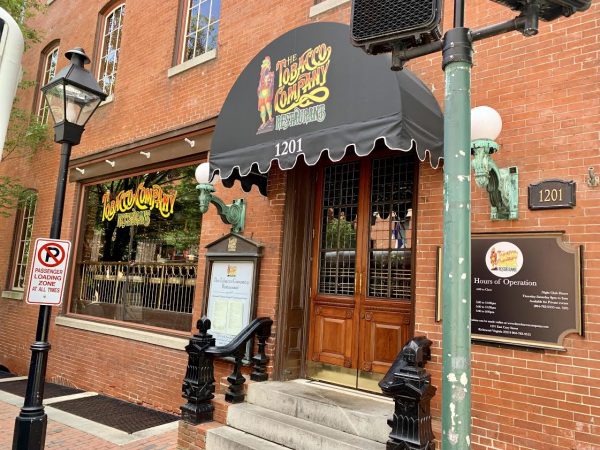
The Tobacco Company Restaurant is among several eateries in town whose owners say they were blindsided by high bills from the city related to meals tax payments. (BizSense file)
Frustrations that have been simmering among Richmond restaurateurs over penalties and fees tied to city meals tax payments reached a boiling point in recent weeks that’s spilling over into the Virginia General Assembly.
Legislation proposed for this year’s assembly session is aimed at putting a stop to what several restaurant owners in Richmond say has been a problem for years: their monthly meals tax payments being applied to unknown late fees and interest charges that, over time and without notice from the city, in some cases snowballed to tens or even hundreds of thousands of dollars owed to the city.
The issue received new attention last week after Kevin Grubbs, owner of Latitude Seafood Co. at Stony Point Fashion Park, aired his grievances on social media over a $68,000 bill that he said stemmed from penalties accrued from a late payment he made in 2020, when the city was proposing a tax amnesty program in the early months of the COVID-19 pandemic.
Grubbs said he later made that payment in full, and every one thereafter, but never knew until years later that the fees were being applied, month after month. Each tax payment he made was being put toward those fees, leaving the rest of his balance for that month unpaid, and so on.
“They continued to balloon out of control, and we went through an appeals process. They said they’d complete the appeal in 90 days; they finished the appeal a year later,” Grubbs said in an interview, adding that penalties continued to be applied over the duration of the appeal.
“Long story short, they gave me one hour (on Dec. 28) to pay $67,739 before it would go to $74,000 the next day, they said. I went ahead and paid it, to stop the bleeding,” he said.
The scenario is similar to those seen by other restaurant owners in town, including Jerry Cable, owner of The Tobacco Company Restaurant, who said he went through a comparable experience that resulted in bills as high as $180,000.
“It’s been going on for four years. These bills are ridiculous,” Cable said.
“This problem’s got to be fixed immediately. It’s not fair to the restaurateurs and certainly not an example that the city wants to set,” he said.
Legislation introduced
Cable’s attorney, Kyle Wingfield of Richmond law firm Williams Mullen, helped draft the legislation that was pre-filed Tuesday for this year’s assembly session, which gets underway today.
Senate Bill 294 – a draft of which was shared with BizSense – would require Richmond and any other locality in the state to apply meals tax payments to the tax returns they accompany, or according to written instructions from the taxpayer.
It also would freeze interest on any unpaid balances 90 days after an appeal or legal challenge is filed; notify taxpayers of delinquent meals taxes before issuing any liens or levies to collect them; and allow taxpayers to be awarded attorney’s fees if they prevail in a dispute.
The bill would amend an existing state law that Wingfield said requires localities to apply tax payments against delinquent accounts. Richmond officials have pointed to that law in responding to inquiries from reporters over the past week.
Wingfield is working with a group that includes the Virginia Restaurant Association (VRA) and Sen. Bill DeSteph, who is sponsoring the bill as chief patron. The group said it has more legislators, including a delegate in the House, lined up to support the bill but declined to name them ahead of the bill’s formal introduction.
“Nobody was hit harder during the pandemic than restaurants,” Wingfield said in an interview. “The city needs to do what they can to try to help these restaurants get their feet back up under them and stay in business, but what they’re doing now is they’re hitting people with bills that are just going to put folks out of business.”
VRA Executive Director Mike Byrne said he’s heard similar tales from more than two dozen restaurant owners in the week following Grubbs’ online missive. He said one restaurant, Beauvine Burger Concept in the Fan, reported a bill in excess of $400,000.
“I’ve been contacted by 25 restaurants basically telling me pretty much the same story,” Byrne said. “They were told they didn’t have to pay their meals tax or they didn’t have to pay the tax on draft beer. The penalty and interest, they couldn’t tell them what it was for.”
Referring to the restaurant owners, Byrne added: “They were willing to pay their tax; they just wanted to know that it was going to the month that they were allocating, and the city couldn’t tell them that. Because of that, they were paying penalty and interest, which in some cases is hundreds of thousands of dollars.”
Added Matt Benka, a lobbyist for VRA: “This is clearly a case where the city has been mismanaging their responsibility to execute the meals tax. As a result of that, we’ve got restaurateurs that have finally gotten together and shared their frustrations and experiences. They’re more widespread than we had possibly imagined.”
Following the law
In responding to the increased attention to the issue, city officials have maintained they are only complying with existing state law that requires that tax payments be applied to the oldest liability first. Late payments are applied a 10 percent penalty, and interest is applied at a rate of 10 percent.
In a Q&A with reporters last week, Chief Administrative Officer Lincoln Saunders said he could not speak on individual cases but said the city is aware of restaurant owners’ concerns and is working to address those that it can.
“The challenge that the city often is stuck between is our desire to support and assist our businesses and the strict confines of the law,” Saunders said in response to one reporter’s question. “State code is very specific and direct about how taxes are to be collected, when assessments are made.”
Saunders noted that the city had implemented two separate amnesty programs, in 2020 and in 2021, on penalties and interest applied to certain meals taxes and other taxes. The programs required that restaurant owners apply to see their penalties and interest waived and did not apply to or reduce the principal tax amount due.
During those programs, Saunders said the city was not pursuing tax collections aggressively and therefore did not notify restaurant owners of delinquent tax bills until collections ramped back up in mid-2022.
“In an instance where a business felt that they were not subject to the meals tax… the state code is pretty clear that the assessment must stand, that there is an assessment,” Saunders said. “That said, I think we can and should look for any and all ways to help rectify things when there are honest mistakes.”
City officials have also said that restaurant owners are made aware of delinquent accounts when they apply for an annual business license, which is withheld until an account is in good standing.
Richmond introduced its meals tax in 1969 and most recently increased it in 2018 to its current rate of 7.5 percent. The additional 1.5 percent provides funding specifically for new school construction and renovations.
Leaving the city
In his online posting in late December, Grubbs said the experience was prompting him to relocate Latitude Seafood outside the city. This week, he reiterated that plan, adding that he is eyeing a move to Chesterfield or Henrico counties.
“I fully intend to leave the city of Richmond. We pay them $288,000 in meals tax per year, and they have taken $68,000. I think that’s very short-sighted,” Grubbs said. “They’re going to lose a significant amount of income. It’s not a good thing for Richmond, especially if we’re ‘the backbone’ of the city.”
Grubbs isn’t alone.
Alex Graf, co-owner of ZZQ Texas Craft Barbecue with husband Chris Fultz, said their experience dealing with the issue has turned them off from opening more restaurants in Richmond. They also own Eazzy Burger next door to ZZQ.
When she applied for the 2021 amnesty program, Graf said she was informed that nearly $6,000 in penalties from a late payment the year before had accrued and – as was the case for Grubbs – needed to be paid within 24 hours. Graf said she paid the bill to avoid additional penalties.
While their bill involved a smaller price tag than others, Graf said the experience has been no less disheartening.
Describing interactions with city staff and administrators on the issue, Graf said, “It’s always like they just can’t even figure it out. They’re understaffed, their programming isn’t up-to-date; it’s all kinds of lame excuses.”
“I know other people have much bigger bills that they’re facing, but we generate a lot of tax money for the City of Richmond through this meals tax from both businesses, and I feel like we do our part,” Graf said. “It’s self-reporting, we report what we get, and I just don’t think they’re a very good partner.
“We will not open another business in the city of Richmond,” she said. “We do intend on opening more businesses, but we won’t do it here in the city.”
The post Restaurant group seeks law change in light of Richmond meals tax issues appeared first on Richmond BizSense.



